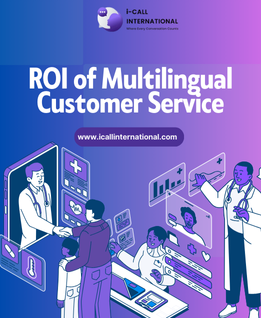In today’s globalized economy, businesses are reaching customers across borders, cultures, and languages. As the demand for international expansion grows, so does the need for multilingual customer support. Offering multilingual services, however, comes with both benefits and challenges, prompting businesses to question whether the investment is truly worthwhile. The short answer is yes—investing in multilingual customer support can deliver significant returns. This article delves into the key reasons why multilingual support is essential, the potential benefits for businesses, and the long-term return on investment (ROI) it can bring.
1. Global Market Penetration

Reaching New CustomersOne of the most immediate advantages of offering multilingual customer support is the ability to reach new customers in international markets. According to the “Can’t Read, Won’t Buy” report from CSA Research, 75% of consumers are more likely to purchase products or services from a website that provides information in their native language. This statistic highlights how language barriers can significantly limit a business’s ability to tap into global markets.Multilingual customer support allows companies to cater to customers in different regions and languages, helping to break down these barriers. By offering support in local languages, businesses can not only expand their customer base but also improve their accessibility and reputation in foreign markets. This is crucial, particularly as consumers today expect personalized and convenient experiences in their native tongue.
2. Improved Customer Experience and Satisfaction

Providing multilingual customer support is directly linked to improved customer satisfaction. A positive customer experience leads to higher retention rates, loyalty, and advocacy. Research from Harvard Business Review shows that customers who are satisfied with a brand’s service are 4.5 times more likely to continue doing business with them. Moreover, 72% of customers prefer to buy from companies that offer support in their native language, according to a study by Common Sense Advisory.When businesses provide multilingual support, they make customers feel valued and understood. Speaking a customer’s native language improves communication efficiency and ensures that the solution provided meets their needs, leading to a more satisfactory resolution of their issues. This, in turn, can result in higher customer retention rates, repeat purchases, and positive word-of-mouth referrals.
3. Competitive Advantage in a Crowded Marketplace

In competitive markets, companies are always looking for ways to differentiate themselves from their competitors. Offering multilingual customer support is a clear way to stand out. In many industries, especially in sectors like eCommerce, technology, and hospitality, businesses that offer multilingual support create a strong competitive edge.According to a survey by the European Commission, only 42% of businesses in Europe offer multilingual customer support, leaving a significant opportunity for companies to attract customers by offering this service. In a world where competition is fierce and customer expectations are continually rising, multilingual support is not just a luxury—it’s an essential tool for gaining and maintaining a competitive edge.Offering multilingual support also signals a company’s commitment to inclusivity and customer-centricity, positioning the brand as both global and culturally sensitive. This can be a key differentiator in attracting diverse customer segments.
4. Increased Sales and Revenue Potential
The potential to increase sales and revenue is one of the most compelling arguments for investing in multilingual customer support. According to CSA Research, 40% of consumers say they would buy more from a business that provides customer support in their native language. By providing assistance in multiple languages, businesses can ensure they capture a larger share of the market in countries where language barriers might otherwise deter purchases.Additionally, multilingual support can increase upsell and cross-sell opportunities. Customer service agents who can communicate in the customer’s native language are more likely to identify sales opportunities that may have been missed in a language barrier scenario. This results in higher conversion rates, increased average order value, and ultimately, increased revenue.
5. Reduced Customer Churn and Increased Retention

Customer churn is one of the most costly challenges businesses face. Acquiring new customers is more expensive than retaining existing ones, and providing excellent customer service is a key factor in retention. According to a study by Bain & Company, increasing customer retention by just 5% can increase profits by 25% to 95%.Multilingual customer support helps businesses reduce churn by ensuring that customers receive the assistance they need in a way they can easily understand. When customers feel supported in their language, their trust in the company grows, fostering loyalty and long-term relationships. A survey by Nimdzi Insights found that multilingual customer support contributes to 15-20% higher customer retention rates, a powerful statistic for any business focused on sustainable growth.Moreover, providing multilingual support not only helps retain existing customers but can also prevent customer loss due to frustration over poor communication. This proactive approach to customer service helps mitigate the risk of negative reviews and lost business due to language barriers.
6. Operational Efficiency and Cost Savings
Many businesses may initially hesitate to invest in multilingual customer support due to perceived high costs. However, when managed efficiently, multilingual support can lead to cost savings in the long run. By using the right technology, such as AI-powered translation tools or multilingual chatbots, companies can scale their support services without significantly increasing their operational costs.Furthermore, multilingual support teams can reduce the need for outsourcing customer service to third-party agencies or local representatives in foreign markets. Having an in-house team that can manage multilingual interactions helps streamline operations and maintain better control over service quality. According to a report from Deloitte, automation and AI in customer support have the potential to reduce operational costs by as much as 30%, especially when it comes to routine inquiries and translations.
7. The Long-Term ROI: A Strategic Investment
While offering multilingual customer support requires an upfront investment in translation services, hiring skilled multilingual agents, and implementing new technologies, the long-term ROI is undeniable. Companies that invest in multilingual support will see increased customer loyalty, improved brand reputation, and ultimately, higher profitability.According to a study by McKinsey & Company, companies that focus on customer experience are 60% more profitable than those that don’t. Offering multilingual support is a key component of creating an exceptional customer experience, particularly for international audiences. The return on this investment becomes evident over time, as businesses capture a larger share of the market and establish themselves as leaders in customer service across borders.
Conclusion
Investing in multilingual customer support is not just a strategic choice; it’s a necessity in today’s interconnected world. By offering support in multiple languages, businesses can expand their reach, improve customer satisfaction, increase sales, and gain a competitive edge. The data is clear—multilingual customer service isn’t just a nice-to-have, it’s a smart business investment that pays off in both tangible and intangible ways.Incorporating multilingual support into your customer service strategy provides not only financial returns but also helps build a loyal customer base, reduces churn, and ultimately contributes to the long-term success and sustainability of the business. The ROI is real, and for businesses looking to thrive in global markets, the investment is undoubtedly worth it.

